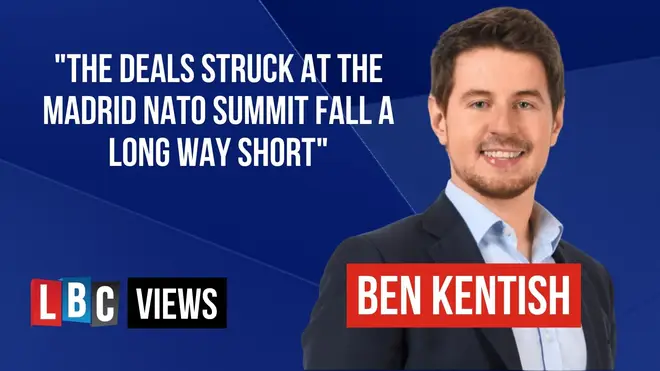
Matt Frei 10am - 12pm
1 July 2022, 00:58 | Updated: 1 July 2022, 09:35

The NATO summit here in Madrid was heralded by leaders from across the alliance as a resounding success.
There were historic agreements on several fronts.
First, the 30 NATO members agreed a massive increase in the number of troops that make up the bloc’s rapid reaction force – from 40,000 today to 300,000.
That will, leaders believe, allow the alliance to react much more swiftly and much more strongly to future aggression from foes like Russia.
There is an acceptance that the West was caught unaware when it came to the speed and scale of the invasion of Ukraine – and a determination to make sure that any such aggression against a NATO member (which Ukraine, of course, is not) in future would trigger a much swifter response.
Second, there was the signing off of a new long-term strategy on perceived threats to NATO, including from China, which the document says “challenges our interests, security and values”.
What precisely NATO plans to do about this is much less clear.
Liz Truss, the UK Foreign Secretary, ended up in tricky waters this week after calling for Taiwan to be given new “capabilities” to help it counter Chinese threats but proving unable to explain whether she thought this should include arms.
China did not feature prominently on the agenda at this summit – no great surprise given the situation in Ukraine – but the agreement of the new strategy is a sign that NATO states are alert to the threat that Beijing continues to pose to their security.
Third, and most significant of all, was the agreement that paved the way for Sweden and Finland to join NATO – possibly within days.
The deal that was struck to convince Turkey to drop its opposition to such a move prompted concerns from human rights campaigners, given that it will lead to the prospect of dozens of Kurds in Scandinavia being extradited to be tried under President Erodogan’s repressive government. Despite this, the agreement was hailed by most leaders here as, to quote Joe Biden, a “historic moment”.
Not only does it expand NATO’s borders northwards but, Western officials feel, it also sends a clear message about the benefits and necessity of the alliance and the foolhardiness of Vladimir Putin’s aggression in forcing other states to seek shelter under NATO’s wings.
From a UK perspective, there were major announcements too: a further 1,000 British troops will be placed on standby to assist NATO allies if required; an additional £1bn will be given in military support for Ukraine, taking the UK total spend on this to £3.7bn; and defence spending will rise to 2.5% of GDP by 2030.
Yet despite all the success stories, it is difficult to leave Madrid without wondering whether it will all count for very much.
Ukrainian officials here were clear in saying that much more will be needed to help them push back Russia’s advances and defend their territory.
While the new support from NATO and additional military aid from member states was welcomed, one Ukrainian MP admitted that he believed the level of weaponry being sent to President Zelensky’s forces needed to increase tenfold for Ukraine to have a real chance of winning the war.
In that context, the deals struck here fall a long way short.
They may help prolong the conflict and give Ukraine’s forces a slightly better chance of an unlikely victory, but if the West is truly serious about stopping Putin winning this war, much more support than was forthcoming this week will be required in the coming months.